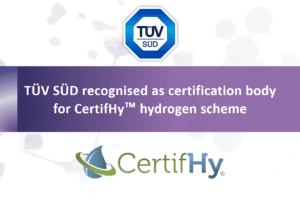The study, which was preliminarily launched earlier this year, will help define the infrastructure, operational viability, and safety and security requirements needed to implement hydrogen as a fuel source for future aircraft operations at ATL. It will also contribute to the understanding of hydrogen supply and infrastructure requirements at airports around the world.
The use of hydrogen to power future aircraft could ultimately eliminate aircraft CO₂ emissions in the air, while also decarbonizing air transport activities on the ground. This study reflects the partners’ ambition to use their respective expertise to support the decarbonization of the aviation industry.
“The potential to decarbonize aviation with green hydrogen is substantial,” noted Plug CEO Andy Marsh. “We are pleased to contribute our expertise in hydrogen infrastructure and applications development to this pioneering effort at Hartsfield-Jackson Atlanta International Airport. We have a ready-made supply of green hydrogen to support the airport from our new Woodbine, Georgia, production plant, the largest green hydrogen plant in the U.S.”
Airbus is currently developing the first hydrogen-powered commercial aircraft with the ambition to enter into service in 2035 and promoting the Hydrogen Hubs at Airports concept.
“The U.S. has easy and massive access to additional renewable energies to produce green hydrogen, and airports are looking for a diverse and balanced energy mix to help reduce the impact of aviation on the environment. Hydrogen is a key enabler for this,” said Karine Guénan, Airbus’ Vice President ZEROe Hydrogen Ecosystem. “The journey to prepare airport infrastructure to support hydrogen and low carbon aviation begins on the ground with studies like this one, working with pioneer players like Delta, Plug and the world’s busiest airport.”
“Hartsfield-Jackson has long been a leader in the commercial aviation industry and it only makes sense that we help lead this effort,” said ATL Senior Deputy General Manager Michael Smith. “If hydrogen proves to be a viable alternative, ATL will investigate options to update infrastructure needs in order to implement the new technology. We are thrilled to participate in this study and look forward to the results.”
As part of the study, ATL is providing the current airport layout plan and organization and will share updates on future developments and findings.
“All aviation stakeholders need to explore new paths in every direction today if the industry is going to reach a more sustainable future of travel by 2050,” said Delta’s Chief Sustainability Officer Amelia Deluca. “While we work to scale sustainable aviation fuel to power today’s aircraft, hydrogen is the key to unlocking the decarbonized future of flight and the next generation of aviation. That’s why we are excited to be part of this journey to help map the industry’s hydrogen blueprints with partners who share our passion for connecting the world.”
Airbus launched the Hydrogen Hub at Airports program to jumpstart research into infrastructure requirements and low-carbon airport operations across the entire value chain. To date, agreements have been signed with partners and airports in ten countries including France, Germany, Italy, Japan, New Zealand, Norway, Singapore, South Korea, Sweden and the United Kingdom.






